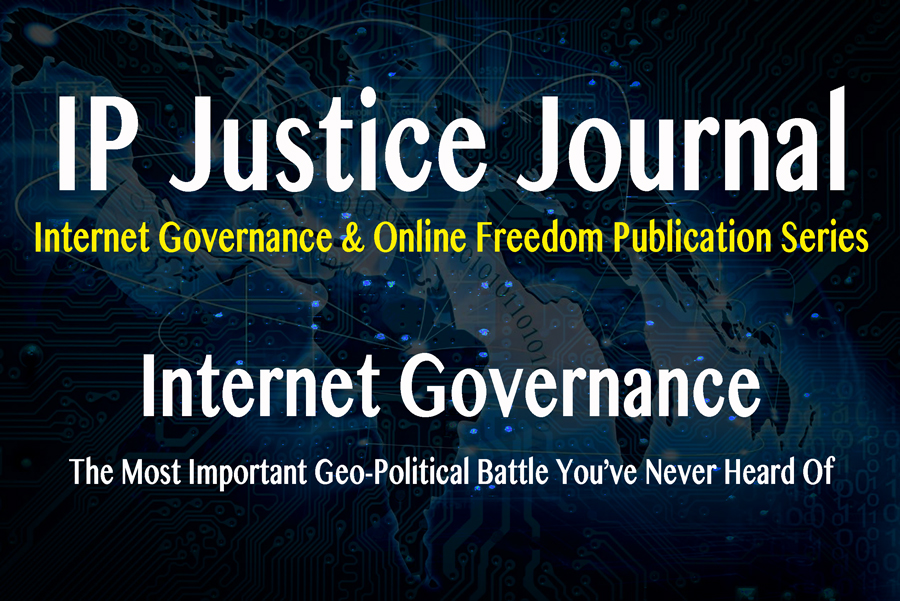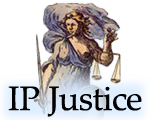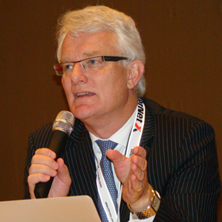
In this series of articles, IP Justice and the collaborating authors explore the role of different stakeholders in Internet governance matters with a view toward protecting Internet freedom.
The Internet governance model known as “multi-stakeholderism” has always been evolving and includes a variety of interpretations and implementations, the most commonly known implementation is ICANN, which manages the Internet’s domain name system. Key features of multi-stakeholderism are that it has operated, to a large extent, based on bottom-up cooperation by those who have a stake in the outcome and by being private-sector-led, in contrast to governance models of the past, which were largely public-sector-led.
However, some governments do not agree with the sharing of power between stakeholders within Internet governance fora such as ICANN, and advocate for the return to public-sector-led governance models for the Internet. Even within ICANN, states have dramatically increased their power in recent years, including heightened requirements that the ICANN Board provide due consideration to governmental “advice” on policy matters. Other stakeholders, including ordinary Internet users reliant on freedom of expression or small businesses dependent on innovation, now struggle with the growing power imbalance as it shifts in favor of nation-states.
All stakeholders are equal. But some stakeholders are more equal than others.
Internet governance has been frequently described as the most important geo-political battlefield that you’ve probably never heard of. To be sure, setting the rules for how the Internet’s domain name system can be used is a remarkably empowering position, with winners and losers determined every day in working groups that resemble a state of perpetual war, via quietly issued staff memos that reverse years of hard-fought community-developed consensus policy, and through hotly contested board decisions, too often rooted in geopolitical concerns, rather than in the health and growth of the Internet.
By focusing on a series of separate and distinct sub-topics within the broader theme that examines the role of key stakeholders, IP Justice hopes to explore the impact of different stakeholders on Internet governance, the trends for relative shifts in power among stakeholders, and any risks or benefits associated therefrom.
In this publication series, IP Justice is collaborating with 10 distinguished authors in order to provide a broad range of expertise and explore a variety of distinct issues that all impact global governance of the Internet and freedom.
Through this IP Justice Journal publication series, IP Justice will publish approximately two new articles a month between July and December 2015, authored by different experts, and focusing on different sub-issues within the broader series theme of “Internet Governance and Online Freedom”.
IP Justice Journal:
Article 1: Implications of the .AFRICA Decision on ICANN
 Internet governance has been frequently described as the most important geo-political battlefield that you’ve probably never heard of. To be sure, setting the rules for how the Internet’s domain name system can be used is a remarkably empowering position, with winners and losers determined every day in working groups that resemble a state of perpetual war, via quietly issued staff memos that reverse years of hard-fought community-developed consensus policy, and through hotly contested board decisions, too often rooted in geopolitical concerns, rather than in the health and growth of the Internet.
Internet governance has been frequently described as the most important geo-political battlefield that you’ve probably never heard of. To be sure, setting the rules for how the Internet’s domain name system can be used is a remarkably empowering position, with winners and losers determined every day in working groups that resemble a state of perpetual war, via quietly issued staff memos that reverse years of hard-fought community-developed consensus policy, and through hotly contested board decisions, too often rooted in geopolitical concerns, rather than in the health and growth of the Internet.
Internet governance has been frequently described as the most important geo-political battlefield that you’ve probably never heard of. To be sure, setting the rules for how the Internet’s domain name system can be used is a remarkably empowering position, with winners and losers determined every day in working groups that resemble a state of perpetual war, via quietly issued staff memos that reverse years of hard-fought community-developed consensus policy, and through hotly contested board decisions, too often rooted in geopolitical concerns, rather than in the health and growth of the Internet.
Internet governance has been frequently described as the most important geo-political battlefield that you’ve probably never heard of. To be sure, setting the rules for how the Internet’s domain name system can be used is a remarkably empowering position, with winners and losers determined every day in working groups that resemble a state of perpetual war, via quietly issued staff memos that reverse years of hard-fought community-developed consensus policy, and through hotly contested board decisions, too often rooted in geopolitical concerns, rather than in the health and growth of the Internet.





